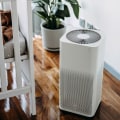As a pet owner, it is essential to take good care of yourself in order to properly care for your animals. If you start to experience chronic respiratory problems, such as asthma and allergies, due to pet dander, you may become too tired and sick to carry out your responsibilities effectively. To prevent this, it is important to use a high-quality air filter in your home's heating, cooling and ventilation system. When selecting an air filter, opt for one specifically designed to capture allergens from pets.
These filters are designed with a high MERV rating (minimum rated efficiency value), indicating their ability to trap microscopic particles such as dander, hair, and even pet odors. HEPA filters are great on their own, but you have options for even greater protection. Consider electronic air filters, which can capture most impurities of 0.1 microns or more. However, to reduce pet dander, you'll want to look for a filter with a rating of at least 11. If you also want to eliminate pet odors, look for a filter with a layer of carbon.
Avoid disposable, low-cost filters unless you absolutely have to buy them. Electronic filters and HEPA filters offer greater value and much better performance. Check if you have respectable MERV ratings and a reputation for good filtration. A limitation of these first-line air filters is that pet hair can make noise during entry.
Also, be prepared to spend more on these air filters than on common HEPA air filters. Set a reminder on your calendar or phone to make sure you replace filters on time, which is generally recommended every 1 to 3 months. An important aspect to consider is the air quality in your home, as pets can produce dander and hair, which can have a significant impact on indoor air pollution. The first type of filter available is the standard-sized Model 1, which fits most medium-efficiency applications, such as those found in homes, businesses and medical facilities.
By following these installation tips and tricks, you can maximize the performance of your 18 x 18 x 1 air filter and create a healthier environment for both you and your pets. Ultimately, choosing between different types of air filter media depends on the application and the specific requirements of each one; however, understanding how each one works will help you find the right solution for your individual needs. Using a filter with a higher MERV rating than it can withstand can result in airflow problems, increased pressure within the system, and other heating and cooling problems. The activated carbon filter neutralizes odors and volatile organic compounds, while the authentic HEPA H13 filter has a high dust capacity.
An efficient air filter traps these tiny particles, preventing them from circulating in the air and causing allergies. Filterjoy offers three different types of air filters so you can choose how often you'll need to change them. If anyone in your household has respiratory problems, it's worth paying for a HEPA air filter. Figuratively speaking, air filters are like home armor: they offer protection against allergens and other airborne particles.
One size in particular is the 18x18x1 filter which is commonly used for residential and commercial applications. While 18 x 18 x 1 air filters may be more cost-effective compared to other sizes, this should not influence your decision-making process if you need effective protection against allergens specifically. For pets it is recommended to replace the 18 x 18 x 1 air filter every 30 or 60 days depending on the number of pets and their hair shedding habits. There are also many special sizes such as 12 x 12 x 1, 20 x 20 x 1 and 24 x 24 x 1 designed for more specific areas such as extractor hoods, bathroom fans and windows.
Once you've done your research it's time to choose the best air cleaning solution for your specific needs and for your pets.



